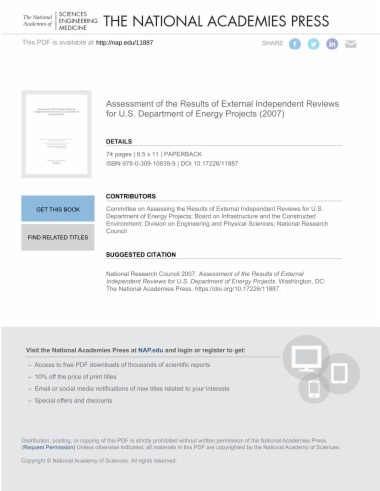

Peer review is an essential component of engineering practice and other scientific and technical undertakings. Peer reviews are conducted to ensure that activities are technically adequate, competently performed, and properly documented; to validate assumptions, calculations, and extrapolations; and to assess alternative interpretations, methodologies, acceptance criteria, and other aspects of the work products and the documentation that support them. Effective peer reviews are conducted in an environment of mutual respect, recognizing the contributions of all participants. Their primary objective is to help the project team achieve its goals. Reviews also contribute to quality assurance, risk management, and overall improvement of the management process.
The U.S. Department of Energy (DOE) conducts different types of peer reviews at the different stages of a project, including reviews to assess risks and other factors related to design, safety, cost estimates, value engineering, and project management. Independent project reviews (IPRs) are conducted by federal staff not directly affiliated with the project or program and management and operations (M&O) contractors. External independent reviews (EIRs) are overseen by the Office of Engineering and Construction Management and conducted by contractors external to the department. EIRs are the primary focus of this report. However, the committee found that, in many cases, IPRs are explicitly used as preparation for or as preliminary reviews prior to EIRs. Thus, because IPRs are integral to the review process in DOE, they are also discussed because they might have an effect on EIRs.
In October 2000, DOE issued Order 413.3, Program and Project Management for the Acquisition of Capital Assets (DOE, 2000). The order established a series of five critical decisions (CDs), or major milestones, that require senior management review and approval to ensure that a project satisfies applicable mission, design, security, and safety requirements: approve mission need, approve alternative selection and cost range, approve performance baseline, approve start of construction, and approve start of operations or project closeout.
Assessment of the Results of External Independent Reviews for U. S. Department of Energy Projects summarizes the results.